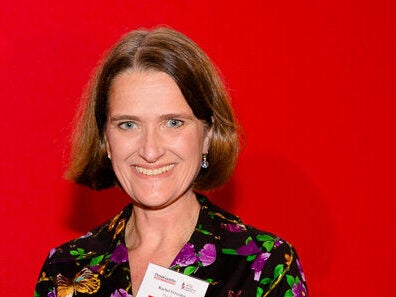
Rachel Sylvester of The Times, who won the Political Journalism prize at this week’s British Journalism Awards feels vindicated after she was “accused of gutter journalism” by Andrea Leadsom MP.
Sylvester’s winning entry included an interview in which Leadsom suggested she would be a better candidate for Tory leader than Theresa May because she had children. The piece prompted Leadsom to withdraw from the race.
Sylvester said: “I’m particularly thrilled to be vindicated.”
Daily Mail journalist Matt Lawton told Press Gazette how he was called a “S-H-I-T journalist” by the father of Lizzie Deignan (then Armistead) after Lawton reported that the cyclist had missed three drugs tests.
Lawton, who won the British Journalism Award for sport, dedicated his award to Deignan’s father, because: “I was physically accosted and abused by [him] on Copacabana beach.”
Commenting on the quality of the other nominees, he said: “Anyone who says journalism is dying, newspapers are dying, they need to see what people [at this event] are doing.”
Rachel Sylvester of The Times, who won the Political Journalism award, recalled how she was “accused of gutter journalism” by Andrea Leadsom MP.
Sylvester’s winning entry included an interview in which Leadsom suggested she would be a better candidate for Tory leader than Theresa May because she had children. The piece prompted Leadsom to withdraw from the race.
Sylvester (pictured with awards judge Peter Cole) said: “I’m particularly thrilled to be vindicated.”
Louise Callaghan from The Sunday Times, who was named New Journalist of the Year for articles written from Istanbul, Lesbos and Berlin, said: “I’m just really happy that the Sunday Times still feel it is important to send correspondents around the world.”
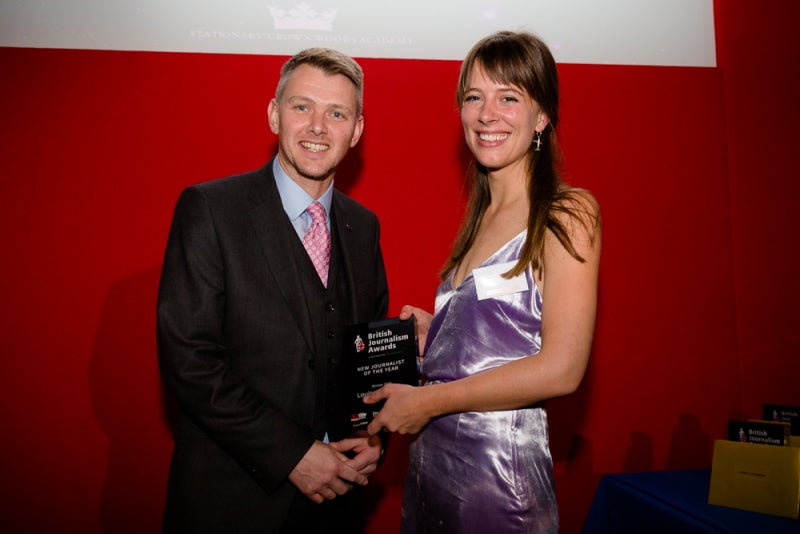
David Millar of the Stationers’ Crown Woods Academy with Louise Callaghan of The Sunday Times
She said her entry from Lesbos, written after the migration crisis had quietened down in the press, showed “the awful conditions that refugees were still being held in” and demonstrated “that just because the numbers had died down then there wasn’t an end to this crisis and there would be repercussions in the long term”.
Dan Jones from The Sun won the Popular Journalism award after revealing how Age UK was making millions by selling pensioners energy and insurance deals which were not the best value on the market.
Jones (pictured below with awards judge Eve Pollard) said: “Age UK were pretty arrogant about it. Eventually they pulled the tariff and kind of admitted they were wrong, but initially they set our lawyers on us trying to discredit the story. But we stuck at it and had a win.”
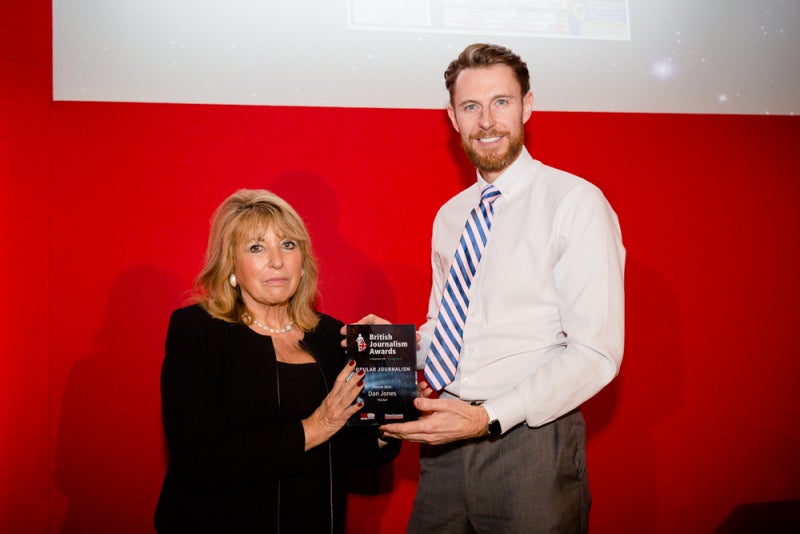
Laura Kuenssberg of BBC News, who won Journalist of the Year, said: “I think that I’ve been lucky to have what I think is the best job in political journalism at probably the most interesting and important year in politics in this country for a long, long time and therefore I’ve had the golden ticket to the best ringside seats.”
Shaun Lintern (pictured below with awards judge Moira Sleight) from the Health Service Journal won the Specialist Journalism award. He said: “I have to say given the strength of the field and the other journalists I was up again I’m really flabbergasted to be quite honest, and quite proud.”
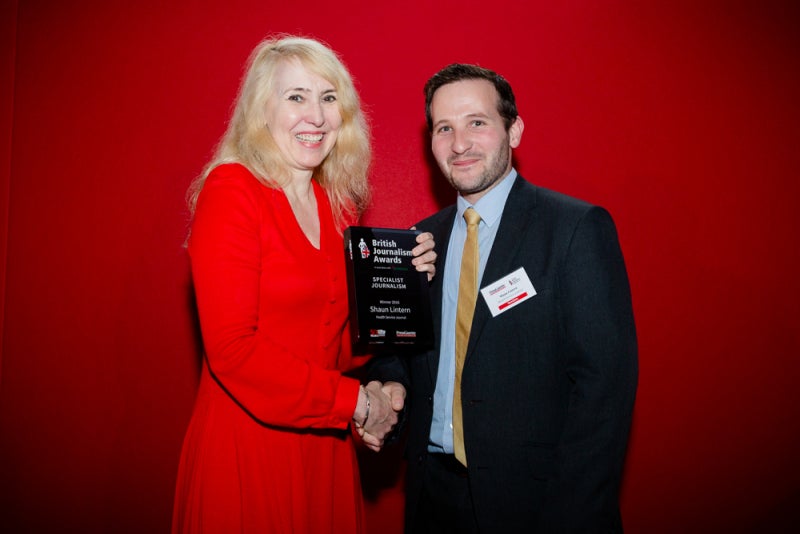
Lintern, who was entered on the back of three stories – Watchdog resigns over deputy’s sexual harassment cover-up, Investigations launched into Stafford Hospital death ‘cover up‘ and Huge leak reveals BMA plan to ‘draw out’ junior doctors dispute – said: “I think the stories I submitted were about public interest journalism at the end of the day. That’s what drives me to do my job.
“We ended up getting the resignation of senior people and exposing some real wrongdoing in the health service which hopefully leads to good care for patients in the long run.”
BBC Panorama and The Guardian won the Investigation of the Year for the Panama Papers investigation.
Richard Bilton, a Panorama reporter (pictured second from left below), said: “Part of what made it great was that it was a combination of journalists around the world; the ICIJ, International Consortium of Investigative Journalists. We all worked together on it, we all broke it together and that’s why it had the impact it did.”
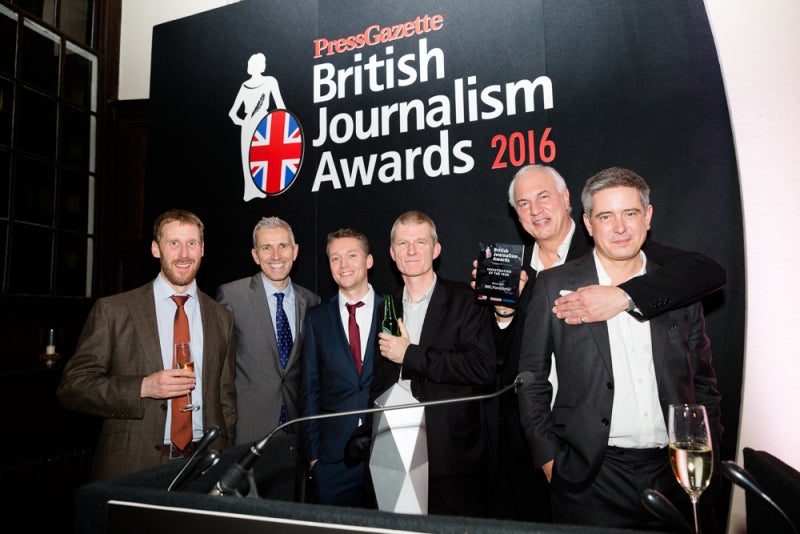
Billy Kenber from The Times won the Science and Technology Journalism award.
His entry was related to his investigation into the extortionate prices charged for certain vital drugs the NHS buys.
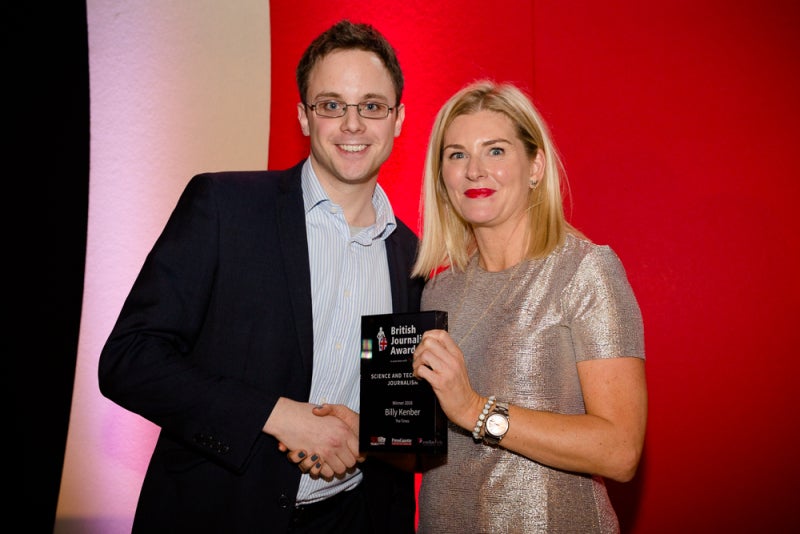
Billy Kenber of The Times pictured with Jo Taylor from Astellas
He said his entry “was particularly satisfying because of the lasting impact it’s hopefully had”. He added: “There’s new legislation going through that’s due to pass in the New Year which is going to hopefully stamp out the problem that these articles expose.”
Charles Moore of The Daily Telegraph won Scoop of the Year after revealing how Archbishop Justin Welby’s secret father was private secretary to Sir Winston Churchill.
Moore said: “I’ve spent most of my life as an editor or a columnist and so what I’ve never got is a scoop, that’s what other people have got. So there’s nothing more exciting than getting the splash on the front page and this was it, and I’m very grateful for that to be recognised.”
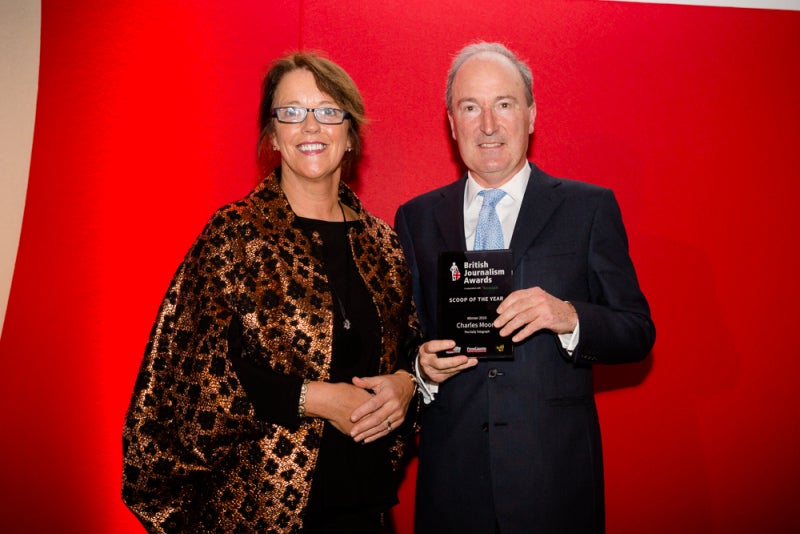
Philip Ide from The Mail on Sunday (pictured below with David Leigh from sponsor Mega), won the Photojournalism award after getting a photo of Michael Gove meeting Boris Johnson before the EU referendum.
On winning the award, he said: “It doesn’t normally happen to people like me, so it means everything.”
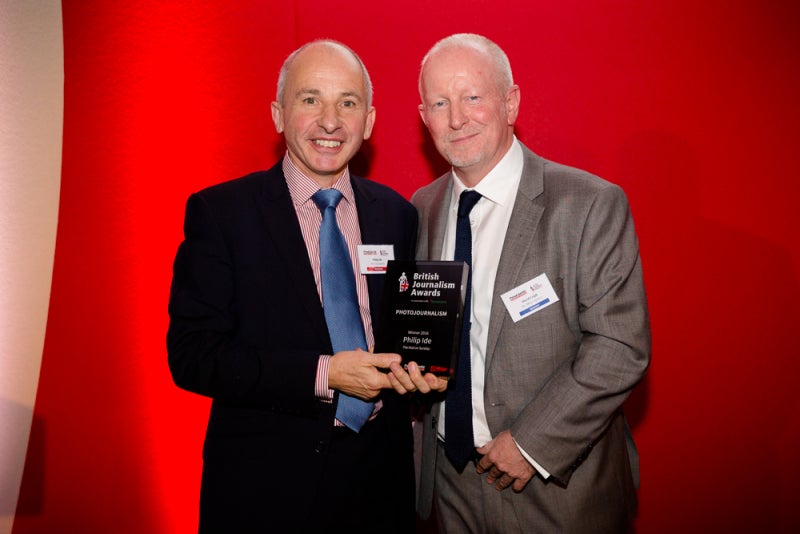
Email pged@pressgazette.co.uk to point out mistakes, provide story tips or send in a letter for publication on our "Letters Page" blog
